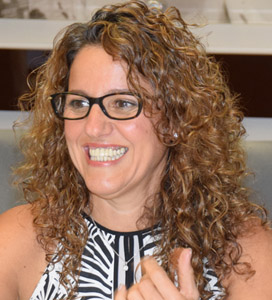
Sonia Gomes de Mesquita
Sonia Gomes de Mesquita, chief program officer at World Jewish Congress, says education is key to fighting anti-Semitism – and there’s still a lot of work to be done.
de Mesquita, who visited the USC Shoah Foundation offices on Tuesday, served in various capacities at World ORT including COO and CEO for 14 years before joining World Jewish Congress in 2013.
The World Jewish Congress (WJC) is the international organization that represents Jewish communities and organizations in 100 countries around the world. It advocates on their behalf towards governments, parliaments, international organizations and other faiths. The WJC represents the plurality of the Jewish people, and is politically non-partisan.
As chief program officer, de Mesquita leads a variety of WJC programs including the Jewish Diplomatic Corps, Global Campus Initiative and the founding of an International Academy for Yiddish Culture in Vilnius, Lithuania.
She said anti-Semitism is a problem that affects the whole society, not just Jewish communities. WJC recently called on European governments to strengthen police protection of Jewish sites, and to ban, or disband violent rallies. Governments must stop the agitation and protect their Jewish populations or Jews will ultimately turn their back on those countries, de Mesquita said. Ultimately, it is the individual governments’ responsibility to protect their Jewish communities.
The most important and effective way to combat anti-Semitism today? Education.
“It’s all about education,” de Mesquita said. “I think it’s important for the next generation to be aware that these things in history took place and that is why it shouldn’t happen again. Only by them knowing that, will they know how to prevent it.”
de Mesquita praised USC Shoah Foundation’s mission to educate through testimony and is impressed by the 50 universities and museums worldwide that have full access to the Visual History Archive. But she doesn’t think the Institute should stop there.
“It’s amazing and fascinating what I saw today,” she said. “But it’s not enough. It’s significant, but [the Visual History Archive] should be spread out much more.”
Teaching the Holocaust is the right thing to do, she added. It’s key for students, families, children and communities.
“It doesn’t matter where you are in the world, education is something that is common to all of us,” de Mesquita said. “It’s a way to have a common language, and the Holocaust can be taught through that.”